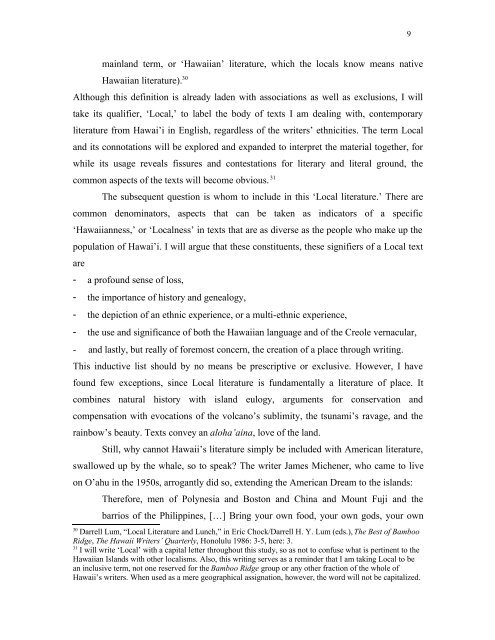A Paradise Lost - KOPS - Universität Konstanz
A Paradise Lost - KOPS - Universität Konstanz
A Paradise Lost - KOPS - Universität Konstanz
Create successful ePaper yourself
Turn your PDF publications into a flip-book with our unique Google optimized e-Paper software.
mainland term, or ‘Hawaiian’ literature, which the locals know means native<br />
Hawaiian literature). 30<br />
Although this definition is already laden with associations as well as exclusions, I will<br />
take its qualifier, ‘Local,’ to label the body of texts I am dealing with, contemporary<br />
literature from Hawai’i in English, regardless of the writers’ ethnicities. The term Local<br />
and its connotations will be explored and expanded to interpret the material together, for<br />
while its usage reveals fissures and contestations for literary and literal ground, the<br />
common aspects of the texts will become obvious. 31<br />
The subsequent question is whom to include in this ‘Local literature.’ There are<br />
common denominators, aspects that can be taken as indicators of a specific<br />
‘Hawaiianness,’ or ‘Localness’ in texts that are as diverse as the people who make up the<br />
population of Hawai’i. I will argue that these constituents, these signifiers of a Local text<br />
are<br />
- a profound sense of loss,<br />
- the importance of history and genealogy,<br />
- the depiction of an ethnic experience, or a multi-ethnic experience,<br />
- the use and significance of both the Hawaiian language and of the Creole vernacular,<br />
- and lastly, but really of foremost concern, the creation of a place through writing.<br />
This inductive list should by no means be prescriptive or exclusive. However, I have<br />
found few exceptions, since Local literature is fundamentally a literature of place. It<br />
combines natural history with island eulogy, arguments for conservation and<br />
compensation with evocations of the volcano’s sublimity, the tsunami’s ravage, and the<br />
rainbow’s beauty. Texts convey an aloha’aina, love of the land.<br />
Still, why cannot Hawaii’s literature simply be included with American literature,<br />
swallowed up by the whale, so to speak? The writer James Michener, who came to live<br />
on O’ahu in the 1950s, arrogantly did so, extending the American Dream to the islands:<br />
Therefore, men of Polynesia and Boston and China and Mount Fuji and the<br />
barrios of the Philippines, […] Bring your own food, your own gods, your own<br />
30 Darrell Lum, “Local Literature and Lunch,” in Eric Chock/Darrell H. Y. Lum (eds.), The Best of Bamboo<br />
Ridge, The Hawaii Writers’ Quarterly, Honolulu 1986: 3-5, here: 3.<br />
31 I will write ‘Local’ with a capital letter throughout this study, so as not to confuse what is pertinent to the<br />
Hawaiian Islands with other localisms. Also, this writing serves as a reminder that I am taking Local to be<br />
an inclusive term, not one reserved for the Bamboo Ridge group or any other fraction of the whole of<br />
Hawaii’s writers. When used as a mere geographical assignation, however, the word will not be capitalized.<br />
9

















